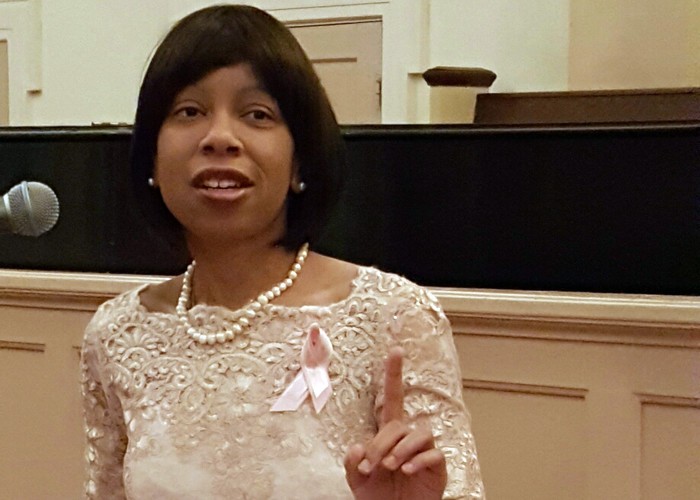
Lexington Physician Plans for Future With Help from UC Oncofertility Team
For Micean Johnikin, MD, a 38-year-old pediatric cardiologist in Lexington, Kentucky, Christmas 2015 wasnt filled with tidings of comfort and joy.
The first week of December 2015, Johnikin found a lump in her right breast during her monthly self-examination. On Dec. 23, she found a lump in her right armpit.
"My mother and my maternal grandmother were both diagnosed with breast cancer, Johnikin explains. "I always considered myself high-risk and did breast self-exams monthly. But I wasnt prepared to find a lump before I turned 40. As a physician, I knew this wasnt a good sign.
Knowing that early detection is the best offense, Johnikin searched for a mammography appointment. She was surprised to find difficulty in seeking care. "I was told it would take four to five weeks to get a mammogram, even with a known lump in my breast and armpit, she says. "Also insurance companies can be reluctant to cover mammograms in younger women.
Johnikin was grateful to find care at the Saint Joseph East Breast Center in Lexington where she received both a mammogram and ultrasound. Her radiologist, Kimberly Stigers, MD, opted to biopsy her breast and lymph nodes, which appeared abnormal on ultrasound. On New Years Eve 2015, Johnikin was diagnosed with Stage 2 breast cancer.
"In pediatric cardiology, we diagnose children and infants with critical heart defects, she says. "For the first time, I was the patient facing a life-threatening diagnosis.
As cancer treatment can impair fertility, fertility preservation is one of many issues facing young women with cancer.
"My world was turned upside down, Johnikin says, "but I had to transpose my fear to faith in God to fight.
After consulting her oncologist, Jessica Moss, MD, and surgeon, John Strifling, MD, both at Saint Joseph East, Johnikin visited Leslie Appiah, MD, an oncogyncologist at the University of Kentucky.
"The first question I asked when I knew I had to face chemotherapy was how to preserve my fertility, she says. "We only had a small window before I was to begin treatment, and still being young and single, I wanted to make sure I had the option to have a family one day.
"Unfortunately, (oncofertility) services are not offered in Lexington, but Dr. Appiah had a great connection with UC; she put me in touch with the oncofertility program there. I had an appointment the first week of Januarywithin four days of the initial call from Dr. Appiah.
After preliminary blood work and ultrasounds, Johnikin started medications for the egg harvesting within 24 hours of her appointment. Thanks to a partnership with LIVESTRONG, these medicines were shipped right to her home. Julie Sroga-Rios, MD, assistant professor in the Department of Obstetrics and Gynecology at the UC College of Medicine and an oncofertility specialist at the University of Cincinnati Cancer Institute, monitored Johnikins egg production every few days via ultrasound. For each appointment, she drove back and forth until her eggs were ready to harvestwhich happened to be on a Sunday.
"I didnt mind a bit because of the incredible service I received at UC, she says. "The UC team was so prompt and so caring, and they made everything extremely easy for me. Even the fact that they were available to do the procedure on a Sundaya weekendwas such a great testament to how service-oriented they are.
Johnikin began presurgical chemotherapy at Saint Joseph East in Lexington one week after her harvesting procedure. "Chemotherapy was challenging, she says, "but through faith, family and friends, I persevered.
"Exercising regularly, including aerobic boxing classes twice a week, also helped. Sometimes it seemed crazy to be boxing in the middle of chemotherapy treatment, but I figured if I could make it through a round of boxing I could take another round of chemo."
This aggressive chemotherapy regimen worked. No signs of cancer were seen at the time of Johnikins lumpectomy in July. She went on to complete radiation therapy under the care of Jacqueline Matar, MD, radiation oncologist also at Saint Joseph East.
"Cancer was terrifying, she recalls, "but having the faith to fight and a great medical team made all the difference.
"I want others to know you can make it through, she adds. "Early detection is critical, even for women under 40. Breast self-exams are important as well as following up with your doctor.
"I am so grateful that I found the oncofertility program at the UC Cancer Institute. I may have had cancer but cancer didnt have me. Cancer did not and will not stop me from living life and fulfilling my purpose.
Related Stories
Ohio could soon make breast cancer screenings more affordable
May 9, 2025
The University of Cincinnati Cancer Center's Ann Brown was featured in Local 12 and Cincinnati Enquirer reports on a bill introduced by Rep. Jean Schmidt in the Ohio legislature that seeks to eliminate out of pocket medical expenses such as copays and deductibles associated with supplemental breast cancer screenings.
Preparing students for artificial intelligence in education
May 8, 2025
Laurah Turner, PhD, associate dean for artificial intelligence and educational informatics at the University of Cincinnati's College of Medicine, recently joined the For The Love of EdTech podcast to discuss the usage of personalized learning and AI coaches to enhance educational experiences.
UC lab-on-a-chip devices take public health into home
May 8, 2025
University of Cincinnati engineers created a new device to help doctors diagnose depression and anxiety. The “lab-on-a-chip” device measures the stress hormone cortisol from a patient’s saliva. Knowing if a patient has elevated stress hormones can provide useful diagnostic information even if patients do not report feelings of anxiety, stress or depression in a standard mental health questionnaire.
